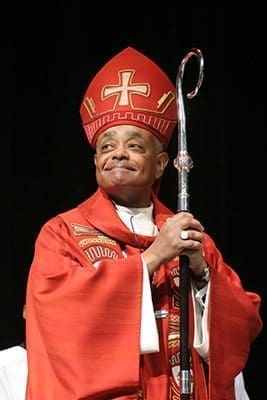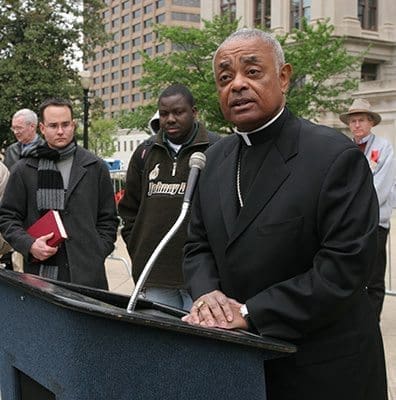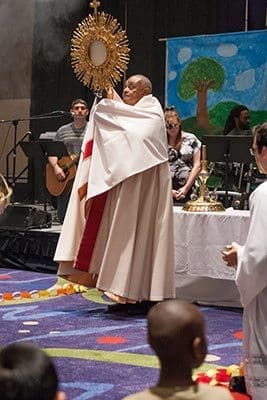 Photo By Michael Alexander
Photo By Michael AlexanderSmyrna
Atlanta’s shepherd oversees local church during time of immense growth
By NICHOLE GOLDEN, Staff Writer | Published January 8, 2015
SMYRNA—The New Year will bring a pastoral plan for the Archdiocese of Atlanta, the 20th anniversary of the Eucharistic Congress in June, and the local observance of the Year of Consecrated Life initiated by Pope Francis. This year also marks the 50th anniversary of “Nostra Aetate,” the Second Vatican Council document that set a new direction for the Catholic Church’s relationship with other faiths.
“We’ve got lots on our plate for 2015,” said Archbishop Wilton D. Gregory, who is celebrating his 10th anniversary as archbishop of Atlanta.
As for the old adage regarding how time flies? “It really does,” said Archbishop Gregory.
Since his installation in January 2005, Archbishop Gregory has overseen new initiatives and shepherded the church during a time of immense growth. Ten years later, the archdiocese has a pastoral council, a restructured deacon formation program, a new Cristo Rey Jesuit High School, and increased dialogue with Greek Orthodox and Jewish communities.
During an interview with The Georgia Bulletin on Dec. 23, the archbishop discussed the many accomplishments of the Catholic community in the last decade. He cited the following as some of the key changes that have come about from 2005 to the present.

Archbishop Wilton D. Gregory enjoys the moment at the conclusion of a multicultural Mass celebrated at Our Lady of Mercy High School, Fayetteville, in February 2006. Photo By Michael Alexander
Archdiocesan Pastoral Council
As an auxiliary bishop in Chicago beginning in 1983, he saw how the Archdiocesan Pastoral Council served as a consultative body for Cardinal Joseph Bernardin. Archbishop Gregory created one in Belleville, Illinois, after he was named bishop there and worked with the group during his 11 years in that diocese, finding it a place of helpful dialogue.
He initiated one in the Atlanta Archdiocese in 2007. Comprised of 25 to 30 people, mostly laypeople, the council is the “diocese in microcosm,” said Archbishop Gregory. Members from across the archdiocese reflect viewpoints from various size parishes and many life circumstances and ministry needs.
Discussions are confidential, and it’s a place where the archbishop can hear from people within the archdiocese and they can listen to the voices of a cross-section of fellow Catholics. The group meets quarterly.
“The pastoral council is an ongoing dialogue, so I use it in a variety of ways to find out what’s going on in the hearts and minds of the people as reflected through that collaborative group,” Archbishop Gregory said.
Strategic Plan, Pastoral Plan, Triennial Review
Following months of surveys, discussions at parishes and deanery meetings, and input from clergy, religious, deacons and lay people, Archbishop Gregory will write and unveil a five-year pastoral plan for the Atlanta Archdiocese early this year. While the process was independent, the pastoral council was involved in the undertaking.
The specific priorities voted as most urgent by each stakeholder group have not been announced, but there was uniformity among Catholics, regardless of their backgrounds, about the directions on which to focus, planners said.
Archbishop Gregory did not find this consistency surprising.
“Our people, by and large, with some individuality, see the challenges they face in their parishes, in their workplace, in their schools, to be largely similar … despite language, age, big parish, small parish, rural parish,” he noted.
This new plan is a second step in the analysis of the needs of the diocese.
A strategic study of the archdiocese was completed seven years ago, an initiative Archbishop Gregory cited as a key one of the last decade. It included a full review of the church’s administrative services and a candid assessment of where church operations needed improvement. The changes made then have been coupled with a system of revisits with pastors to enhance communication and keep insights fresh.
“It has resulted in a triennial visit on the part of the Office of Planning with every pastor to see how we are serving them and how we can serve them more effectively,” said the archbishop. “Peter Faletti (archdiocesan director of planning and research) goes around and visits every pastor every three years to say, as Ed Koch used to say when he was mayor, ‘How am I doing?’”
The visits help staff explore what is working and what is not.
“Now the pastoral planning process that we are concluding asks the question, ‘What should we be doing as a diocese together?’ to build up and strengthen the life of the church over the next five years,” explained Archbishop Gregory.
Diaconal formation program
Archbishop Gregory served as president of the U.S. Conference of Catholic Bishops in the early 2000s, and during that time the conference established the National Directory for permanent deacon formation. The guide outlines how bishops ought to be preparing deacons in America.
The formation program for deacons in Atlanta was restructured after the archbishop’s arrival beginning in 2006. Deacon Dennis Dorner, who became director of the permanent diaconate office that year, led the process. An internal self-study by 11 local people reviewed the entire diaconate program from candidate selection to post-ordination. Then the Atlanta Archdiocese became the first diocese to invite in a national evaluation team to make recommendations about strengthening facets of the formation program and deacons’ ministry in light of the new directory. A class was not formed in 2009 as changes were implemented in how candidates were evaluated and in strengthening the curriculum. The vision of the U.S. bishops was that a National Directory would strengthen the permanent diaconate across the country and make a common roadmap from one diocese to another.
“I wanted to make sure it was in place here in the archdiocese and it has been implemented,” Archbishop Gregory said. “I think it’s resulted in a much more cohesive and, I hope, focused way of preparing men for the diaconal service.”
Interfaith, ecumenical outreach
The year 2005 was the 40th anniversary of the Second Vatican Council document, “Nostra Aetate” (“In Our Time”). The document established a new and positive tone for the church’s relationship with non-Christian faiths, especially with Judaism. Archbishop Gregory said the anniversary was an important occasion to commemorate in the Atlanta Archdiocese with the local Jewish community.

Archbishop Wilton D. Gregory gives some opening remarks during the 2007 Good Friday Pilgrimage on the steps of the Georgia State Capitol, Atlanta. Photo By Michael Alexander
“We immediately dialogued with our Jewish partners and we had a festival of sacred music at The Temple where we shared some of the musical heritage of Judaism and Catholicism in a common prayer context,” recalled the archbishop.
For this year’s 50th anniversary of “Nostra Aetate,” expanded events are planned, including a visit in January by Rabbi Abraham Skorka of Argentina, a longtime friend of Pope Francis, co-sponsored by the Atlanta Archdiocese. The relationship between the two faiths will be celebrated by a number of educational, artistic and community-building events.
During the past five years, there has also been an increased focus on relations with the Greek Orthodox Church. Archbishop Gregory and Metropolitan Alexios of the Greek Orthodox Metropolis of Atlanta preside at twice yearly prayer services as an opportunity for fraternity.
Father Paul Burke serves as the archbishop’s delegate. Archbishop Gregory said that a “wonderful couple,” Marianna and Solon Patterson, have really sustained and encouraged the gatherings.
Grace Scholars and Catholic schools
Grace Scholars is one of 28 scholarship organizations operating under the Georgia Private School Tax Credit law. It allows individuals and corporations to receive tax credits for donations to student scholarship organizations, up to a statewide limit currently of $58 million a year. It’s so popular, this year the limit was reached on Jan. 1.
Grace Scholars is a partnership between the Diocese of Savannah and the Archdiocese of Atlanta, created in 2008 by the bishops of the two dioceses to take advantage of the tax credit legislation passed in Georgia. It has proven to be a much-needed source of additional tuition assistance to help students with demonstrated financial need attend archdiocesan Catholic schools.
Archbishop Gregory called the program a “great gift” in the state of Georgia.
“It raises $4 million annually through tax credits which now allows about 1,000 kids from poor backgrounds to have a Catholic education in the two dioceses,” he said. “It is ecumenical in the sense you don’t have to be a Catholic to benefit.”
Archbishop Gregory also said he is very pleased with the quality of Catholic schools in the archdiocese.
“Fortunately, Dr. Diane Starkovich, our director of Catholic schools, has been such a grace, such a wise and dedicated leader, that our schools continue to improve and to grow,” he said.
Cristo Rey Atlanta Jesuit High School
The opening of Cristo Rey Atlanta Jesuit High School in the fall of 2014 was the fulfillment of a 10-year-old dream of the archbishop. The Cristo Rey model of education serves young people of limited economic means and includes a rigorous college preparatory curriculum and work-study experience.
Archbishop Gregory first arrived in Atlanta the evening of Dec. 8, 2004, to be publicly appointed as head of the local church the next day. “When I landed in Atlanta I already had it in my heart that this diocese would benefit from a Cristo Rey,” said the archbishop.
The Cristo Rey movement was relatively new at the time, having started in Chicago in 1996. But Archbishop Gregory wanted it for this community from day one.
“Now it’s taken some time to get it up and running, but it’s something I feel we need to be doing for children who come from economically disadvantaged backgrounds, and it’s taken off with amazing success and enthusiasm.”
The school, which is an independent Catholic school and a Jesuit apostolate, is located in the former administrative offices of the archdiocese on West Peachtree Street and has 160 students enrolled in its inaugural freshman class.
Annual Appeal restructuring
In 2011, the Archbishop’s Annual Appeal process changed to involve an in-pew appeal and to shift to calendar year timing. The annual campaign helps fund the work of the ministries and offices of the archdiocese.
“With the restructuring of the Annual Appeal, we are on the threshold of exceeding all the goal this year and of adding more people who have participated than ever before,” said Archbishop Gregory.
When a parish goes over its fundraising goal, 90 percent of the extra money goes back to the parish tax-free to be used for local needs as determined by the parish and 10 percent is allocated to the parish endowment fund at the Catholic Foundation of North Georgia.
“It does wonderful work,” emphasized the archbishop.
Growth in the Church
The Rite of Election in the Archdiocese of Atlanta is always a wonderful expression of the Catholicity and cultural diversity in this region, said the archbishop.
“I’m also very proud that we have an annual Rite of Election that welcomes nearly 2,000 newly received or reinvigorated Catholics,” he said.

Archbishop Wilton Gregory blesses the children during the Kids Track at the 2013 Eucharistic Congress. Photo by Thomas Spink
While the numbers are impressive, Archbishop Gregory hopes to find new ways to reach out to even more of those who are no longer practicing their Catholic faith, even though the new evangelization must surmount the many distractions luring people of this generation.
“Every generation has to rise to a challenge they may not have anticipated, but that is part of the world they inherit, and hopefully will improve,” he said. “The faith survives under all kinds of political, social, and economic challenges.”
The Eucharistic Congress, begun by the late Archbishop John F. Donoghue, has been folded into the ongoing life of the Atlanta Archdiocese and is embraced each year by an estimated 20,000 to 30,000 people who come from Georgia and surrounding states to hear Catholic speakers and celebrate the “source and summit of the Catholic faith.”
The 20th Eucharistic Congress will be held June 5-6 at the Georgia International Convention Center in College Park. The special anniversary event will have the theme “I Will Be With You Always.”
“Here in the Southeast, it is the finest expression of Eucharistic devotion,” said Archbishop Gregory.
In the decade of serving as Atlanta’s shepherd, Archbishop Gregory has blessed or dedicated 12 new or renovated churches in the archdiocese.
“We’re going through exactly the opposite challenges of many of the dioceses in the North and Mid-Atlantic,” he noted.
The archdiocesan Office of Planning and Research estimates that the Catholic population is about 1 million people, half of whom may be unregistered in parishes, and that the state of Georgia is now 12 percent Catholic and is growing rapidly and growing more diverse culturally.
In the last decade, the archdiocese and its people have also benefited from an increased presence of religious order priests.
“We welcomed the Dominicans back; the Conventual Franciscans, the Legionaries of Christ have increased their numbers,” said Archbishop Gregory. “This helps us not simply because they are warm bodies to do more work, but they bring their religious charisms, so we are enriched by a diversity of experiences of living the Catholic faith.”
Archbishop Gregory credits “very generous priests and dedicated deacons” along with many parishioners for the expansion of prison ministry and outreach in the archdiocese.
“We take very seriously the Gospel mandate to care for those who are in prison as well as those who are poor, those who are hungry,” said the archbishop. “We are trying to live as best we can the admonition of caring for the least.”